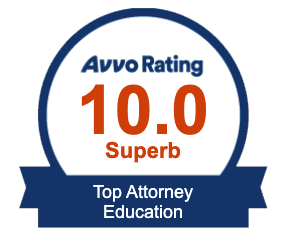Parents are often faced with addressing a school system’s violation of their rights under the IDEA. What should parents do? There are informal and formal ways for parents to address violation of their rights. And there are many different types of remedies for violation of your rights. Parents can also speak to the special education director or other school official to seek redress for violation of their rights. I do not recommend that you try to speak to the school board of education. Why? School board members are not responsible for your child’s special education programming and instruction. School board members have no direct authority to address your concerns.
A more formal process for addressing your possible violation of your rights is to file a state complaint or file a due process complaint. I would strongly advise you to seek the advice of a special education attorney before you file a state complaint or due process complaint. I have spoken to many parents over the years who did not know what they really were doing after filing for a due process. Special education litigation is complex. Special education litigation should not taken lightly. I generally recommend for parents to pursue a due process hearing if there are no other reasonable alternatives. Another reason is when there is an urgent issue that must be considered by the school system for your child as soon as possible.
Settlement of Disputes
Suppose you file for due process and the school system agrees to settle your case. . . . what should you ask for? In general, you can propose almost any type of settlement to the school system. The type of settlement you achieve is not limited to what the law provides. For example, in one mediated settlement, the parents wanted to speak to the school board members about their concerns. The school system agreed. If this case had been litigated, a judge would not enter an order requiring the school board to hear the parents’ concerns. One caveat, however, is the revision or amendment of an IEP cannot occur in mediation. The mediation agreement will provide for the parents and IEP team to meet to change or amend the child’s IEP.
You can also seek other unusual or different type of remedies in a special education dispute at a resolution session. A resolution session is a type of settlement forum. All of the typical confidentiality rules for settlement apply in a resolution session. You should be prepared in most special education settlements to agree to a confidentiality clause. This clause prohibits you from discussing the terms and conditions of settlement in public and to third parties outside your immediate family.
Due Process Hearings
If a judge rules in your favor after a due process hearing the type of remedies available are still varied but somewhat more limited. Generally, judges may award compensatory education, reimbursement of expenses, or order a school system to pay for a private placement. I often hear from parents that they want to school system to pay for their child’s private school placement. Although this remedy may be preferred by some parents, the legal barriers are often difficult to overcome. A parent must prove the school system failed to provide his or her child did not receive a free appropriate public education. Second, a parent must further prove the proposed or selected private placement for the child is appropriate. Third, a parent must show that he or she complied with the procedural requirements for requesting private placement.
I will provide a more extensive discussion of the legal requirements for requesting private school placement in another post. A parent may also request reimbursement of expenses for special education instruction and services that should have been provided to the child. Compensatory education is special education instruction and services the child should have received because the school system failed to provide FAPE. Courts have discretion in awarding compensatory education.
The gist of this advice is to secure the representation of a special education lawyer before you decide on any type of special education litigation. It will likely result in you securing a better settlement or better decision in due process. It may also result in securing the type of remedy or remedies that you really want. I fully understand that many parents cannot afford hiring an attorney for special education litigation and due process. But there is no reason why most parents cannot at least request a special education attorney review their case to determine if it has sufficient merit to prevail at due process.

